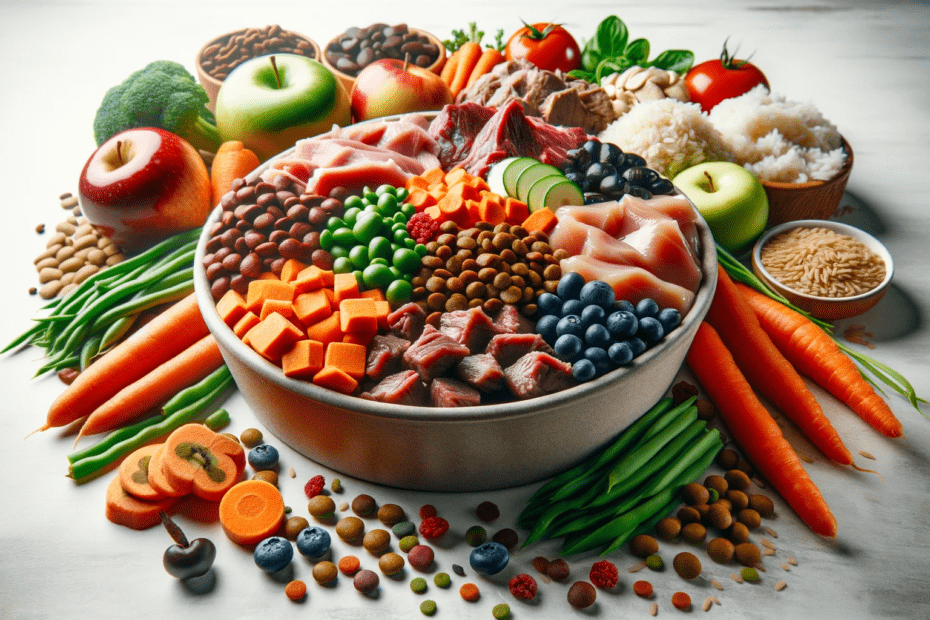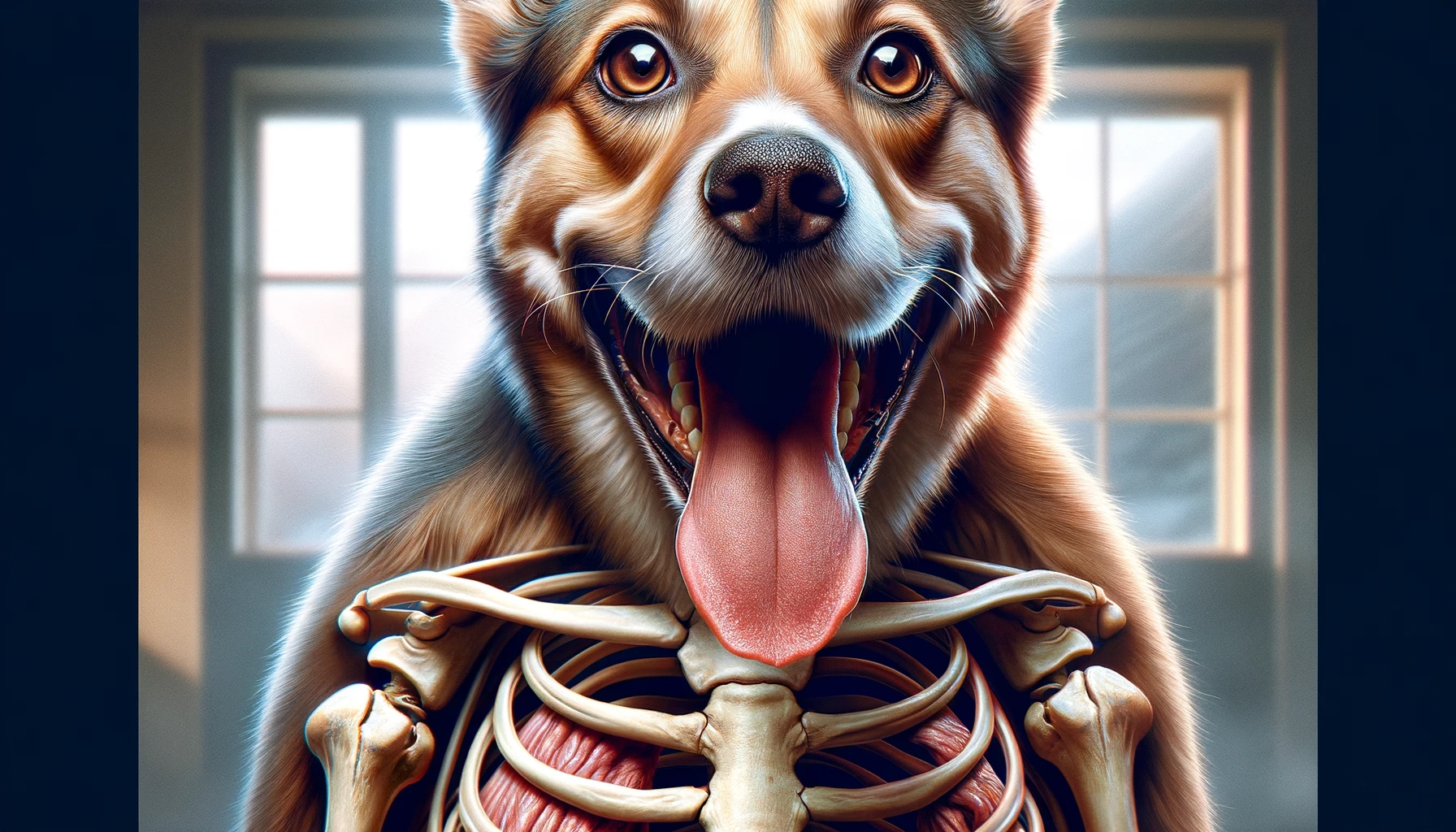Are you looking to keep your furry friend in the best shape possible? Look no further! In this article, we'll provide you with 8 key nutritional tips for optimal dog health.
From the importance of balanced nutrition to special dietary considerations for specific breeds, we've got you covered. Discover how protein builds strong muscles, essential fatty acids promote a healthy coat, and carbohydrates provide energy for active dogs.
Keep reading to learn more about feeding guidelines and maintaining your dog's overall health.
Key Takeaways
- Balanced diet is essential for meeting dog's nutrient requirements and maintaining optimal health
- Protein is crucial for muscle development and repair
- Essential fatty acids keep dog's coat soft and shiny
- Carbohydrates provide energy for active dogs
The Importance of Balanced Nutrition
Ensure your dog's health and well-being by providing them with a balanced diet. A balanced diet is essential for meeting your dog's nutrient requirements and maintaining optimal health. Just like humans, dogs need a variety of nutrients to support their bodily functions and overall well-being.
A balanced diet for dogs should consist of high-quality proteins, carbohydrates, fats, vitamins, and minerals. Proteins are crucial for muscle development and repair, while carbohydrates provide energy. Fats are a concentrated source of energy and aid in the absorption of fat-soluble vitamins. Vitamins and minerals are essential for various physiological processes and play a vital role in maintaining a healthy immune system.
To ensure your dog receives a balanced diet, it's important to choose a commercial dog food that meets the Association of American Feed Control Officials (AAFCO) standards. These standards ensure that the food provides all the necessary nutrients in the correct proportions. Additionally, you can supplement your dog's diet with fresh fruits and vegetables, as they're packed with essential vitamins and minerals.
Protein: Building Blocks for Strong Muscles
To support your dog's muscle development and strength, it's essential to include protein-rich foods in their diet. Protein is a crucial nutrient that serves as the building block for strong muscles. It provides the necessary amino acids that aid in muscle growth and repair.
The protein requirements for dogs vary based on factors such as age, size, and activity level. Puppies and highly active dogs require more protein than adult dogs with a sedentary lifestyle. As a general guideline, dogs should consume a diet that consists of at least 18-25% protein.
When choosing protein sources for your dog, opt for high-quality animal-based proteins such as chicken, beef, fish, or eggs. These sources provide the complete amino acid profile necessary for muscle development. Additionally, they're highly digestible, ensuring that your dog can absorb and utilize the protein efficiently.
It's important to note that while dogs need protein for muscle development, it should be balanced with other nutrients to maintain overall health. Consult with your veterinarian to determine the appropriate protein requirements for your dog based on their specific needs.
Essential Fatty Acids for a Healthy Coat
Including essential fatty acids in your dog's diet is crucial for maintaining a healthy coat. Just like humans, dogs have dietary requirements that need to be met to ensure optimal health.
When it comes to their coat, certain nutritional supplements can make a significant difference. Here are three key benefits of essential fatty acids for your dog's coat:
- Improved Coat Texture: Essential fatty acids, such as omega-3 and omega-6, play a vital role in keeping your dog's coat soft and shiny. These fatty acids help to moisturize the skin, reduce inflammation, and prevent dryness and itchiness. A healthy coat not only looks great but also indicates overall well-being.
- Reduced Shedding: If you're tired of constantly finding dog hair on your furniture and clothes, incorporating essential fatty acids into your dog's diet can help. These fatty acids help to strengthen hair follicles and reduce shedding. By providing the necessary nutrients, you can minimize excessive shedding and keep your dog's coat healthy.
- Skin Health: The health of your dog's coat is closely linked to the health of their skin. Essential fatty acids help to maintain the integrity of the skin barrier, preventing moisture loss and keeping the skin hydrated. This can reduce the risk of skin conditions such as dryness, dandruff, and dermatitis.
Carbohydrates: Energy Source for Active Dogs
Incorporating carbohydrates into your dog's diet is essential for providing them with the energy they need, especially if they're active. Carbohydrates are a type of macronutrient that's broken down into glucose during the digestion process. Glucose is the primary source of energy for the body, including the muscles. When your active dog engages in physical activities like running or playing, they require higher energy levels, which can be obtained from carbohydrates.
Complex carbohydrates, such as whole grains, fruits, and vegetables, are particularly beneficial for dogs. Unlike simple carbohydrates, which are quickly digested and can cause a spike in blood sugar levels, complex carbs are digested more slowly, providing a steady release of energy. This sustained energy release is particularly important for active dogs as it helps maintain their energy levels throughout the day.
Including complex carbohydrates in your dog's diet can also have other benefits. They're a good source of fiber, which aids in digestion and promotes a healthy gut. Additionally, complex carbs contain essential vitamins, minerals, and antioxidants that support overall canine health and wellbeing.
To ensure your active dog gets the energy they need, consider incorporating complex carbohydrates like whole grains, sweet potatoes, and fruits into their meals. However, it's important to consult with your veterinarian to determine the appropriate amount and type of carbohydrates for your dog's specific needs.
Vitamins and Minerals: Supporting Overall Health
Now let's talk about vitamins and minerals, essential nutrients that play a crucial role in supporting your dog's overall health. These micronutrients are necessary for various bodily functions, such as maintaining a strong immune system, promoting healthy bones and teeth, and supporting optimal brain function.
Vitamins and minerals can be found in a variety of food sources, and it's important to provide your dog with a balanced diet that meets their specific needs. Consulting with your veterinarian can help determine the appropriate dosage and recommendations for your furry friend.
Essential Nutrient Sources
Ensure your dog's overall health by incorporating essential nutrient sources, such as vitamins and minerals, into their diet. Meeting your dog's nutrient requirements is crucial for their overall well-being.
While a balanced diet can provide most of the necessary nutrients, dietary supplements can be beneficial in some cases. Here are three essential nutrient sources for your dog:
- Vitamin A: This vitamin is essential for your dog's vision, immune function, and cell growth. It can be found in liver, carrots, and sweet potatoes.
- Calcium: Calcium is vital for strong bones and teeth. Dairy products, leafy greens, and bone meal are excellent sources of calcium for your dog.
- Iron: Iron is necessary for oxygen transport and energy production. Include lean meats, fish, and fortified cereals in your dog's diet to ensure an adequate iron intake.
Incorporating these nutrient sources into your dog's diet can contribute to their overall health and well-being.
Health Benefits Explained
To support your dog's overall health, it's important to understand the health benefits of vitamins and minerals, as they play a crucial role in maintaining their well-being.
Vitamins and minerals are essential nutrients that support various bodily functions and promote a healthy immune system. For example, vitamin A is important for vision and immune function, while vitamin D helps in the absorption of calcium and phosphorus, promoting strong bones and teeth.
Minerals like iron, zinc, and selenium are crucial for energy production, cell function, and antioxidant defense.
Meeting your dog's nutritional requirements for vitamins and minerals can help prevent deficiencies and promote optimal health.
It's recommended to provide a balanced diet that incorporates a wide variety of nutrient-rich foods or consider supplements if necessary.
Dosage and Recommendations
To support your dog's overall health, it's important to understand the proper dosage and recommendations for vitamins and minerals that support their well-being. Nutritional supplements can play a crucial role in enhancing your dog's health, but it's essential to follow the dosage recommendations to avoid any adverse effects.
Here are three key points to consider:
- Consult your veterinarian: Before adding any supplements to your dog's diet, it's best to consult with your veterinarian. They can provide personalized recommendations based on your dog's specific needs and health condition.
- Quality matters: When choosing nutritional supplements, opt for reputable brands that undergo rigorous quality testing. Look for products that meet the standards set by organizations like the National Animal Supplement Council.
- Be cautious with dosage: Follow the recommended dosage instructions provided by the manufacturer. Giving your dog excessive amounts of vitamins and minerals can lead to toxicity, while insufficient amounts may not provide the desired health benefits.
Hydration: Keeping Your Dog's Body Functioning Properly
Keep your dog's body functioning properly by ensuring adequate hydration. Just like humans, dogs need to stay hydrated to maintain optimal health. Water is essential for various bodily functions, including digestion, circulation, and temperature regulation.
As a responsible pet owner, it's crucial to monitor your dog's water intake and provide clean, fresh water at all times.
The amount of water your dog needs can vary depending on factors such as their size, activity level, and the weather. On average, dogs should drink about 1 ounce of water per pound of body weight each day. However, active dogs or those in hot climates may require more. Keep an eye out for signs of dehydration, such as dry gums, loss of skin elasticity, lethargy, and dark urine. If you notice any of these symptoms, it's important to encourage your dog to drink more water and consult with your veterinarian.
In addition to providing fresh water, you can also incorporate moisture-rich foods into your dog's diet. Wet dog food, homemade broths, and adding water to dry kibble are all ways to increase your dog's hydration.
Feeding Guidelines: Portion Control and Meal Frequency
When it comes to feeding your dog, portion control and meal frequency are key factors to consider.
It's important to provide your dog with the right amount of food to maintain a healthy weight and prevent overeating.
Additionally, establishing a consistent meal schedule can help regulate their digestion and prevent gastrointestinal issues.
Portion Sizes for Dogs
For optimal dog health, it's important to be mindful of the portion sizes you feed your furry companion. Proper portion control and meal frequency are key factors in maintaining your dog's weight and overall well-being.
Here are some important guidelines to consider:
- Portion control:
- Measure your dog's food accurately to avoid overfeeding.
- Follow the recommended guidelines provided by the dog food manufacturer or consult with your veterinarian for personalized recommendations.
- Adjust portion sizes based on your dog's activity level, age, and breed.
- Meal frequency:
- Divide your dog's daily food intake into multiple meals to aid digestion and prevent bloating.
- Puppies generally require more frequent meals compared to adult dogs.
- Consult with your veterinarian to determine the appropriate number of meals for your dog based on their specific needs.
Timing of Meals
To ensure optimal dog health, it's essential to establish a consistent schedule for meal times. A regular feeding schedule helps regulate your dog's metabolism and digestion. Aim to feed your dog at the same times every day, as this will help maintain their energy levels and prevent overeating.
Ideally, dogs should be fed twice a day, with a 12-hour interval between meals. This allows for proper digestion and avoids the discomfort associated with an empty stomach. However, some dogs may benefit from more frequent, smaller meals, especially puppies or dogs with certain health conditions.
It's important to consult with your veterinarian to determine the best feeding schedule for your dog based on their individual needs.
Frequency of Feeding
Establishing a consistent feeding frequency is crucial for maintaining optimal dog health. A well-planned feeding schedule ensures that your furry friend receives the right amount of nutrients throughout the day. Here are some key points to keep in mind when it comes to meal timing:
- Regular meal schedule: Dogs thrive on routine, so try to feed them at the same times every day. This helps regulate their digestion and prevents overeating.
- Divide meals: Instead of one large meal, divide your dog's daily food portion into two or three smaller meals. This helps prevent bloating and improves nutrient absorption.
- Avoid free-feeding: Leaving food out all day may lead to overeating and obesity. Stick to scheduled mealtimes to control your dog's portions and maintain a healthy weight.
Special Dietary Considerations for Specific Breeds
Adjusting the diet of your specific breed is crucial for maintaining their optimal health. Different dog breeds have unique characteristics that can affect their specific dietary restrictions and special nutritional needs.
For example, large breed dogs such as Great Danes and Mastiffs are prone to skeletal issues, so their diet should be carefully balanced to support healthy bone development. These breeds require controlled calcium and phosphorus levels to prevent rapid growth and potential joint problems.
On the other hand, small breed dogs like Chihuahuas and Yorkshire Terriers have higher metabolic rates and may benefit from a diet that's higher in fat and protein to meet their energy needs. Additionally, certain breeds may have allergies or sensitivities to specific ingredients, such as grains or certain proteins.
It's important to be aware of these sensitivities and choose a diet that avoids triggering any adverse reactions. Consulting with your veterinarian can help you determine the best diet for your specific breed, taking into account their unique nutritional requirements and potential sensitivities.
Frequently Asked Questions
Can I Feed My Dog a Diet Consisting Solely of Protein for Optimal Health?
You should not feed your dog a diet consisting solely of protein for optimal health. While protein is important, a balanced diet with other nutrients is necessary to avoid potential risks and drawbacks.
How Much Water Should My Dog Drink per Day to Stay Properly Hydrated?
To prevent dehydration in dogs and ensure optimal health, it's important for your furry friend to drink an adequate amount of water each day. Water plays a crucial role in a dog's diet, so make sure they stay properly hydrated.
Is It Necessary to Provide My Dog With a Variety of Carbohydrates in Their Diet?
To keep your dog healthy, it's important to provide a variety of carbohydrates in their diet. Carbs provide energy and fiber, which aid in digestion. Alongside hydration, a balanced diet ensures optimal dog health.
Are There Any Specific Vitamins or Minerals That Are Particularly Important for My Dog's Overall Health?
There are specific vitamins and minerals that are particularly important for your dog's overall health. These nutrients play a vital role in supporting your dog's immune system, bone health, and energy production.
Are There Any Dietary Considerations That Are Specific to Certain Breeds of Dogs?
When it comes to breed-specific dietary considerations, it's important to understand that different breeds have different nutritional needs. Additionally, some dogs may have common nutritional allergies, so it's crucial to be aware of potential allergens in their diet.
Conclusion
In conclusion, providing your dog with a balanced and nutritious diet is essential for their overall health and well-being. By including high-quality proteins, essential fatty acids, carbohydrates, vitamins, and minerals in their meals, you can support their muscle strength, coat health, energy levels, and overall body functions.
It's also important to ensure proper hydration and follow feeding guidelines to maintain optimal health. Remember to consider any special dietary needs specific to your dog's breed.






